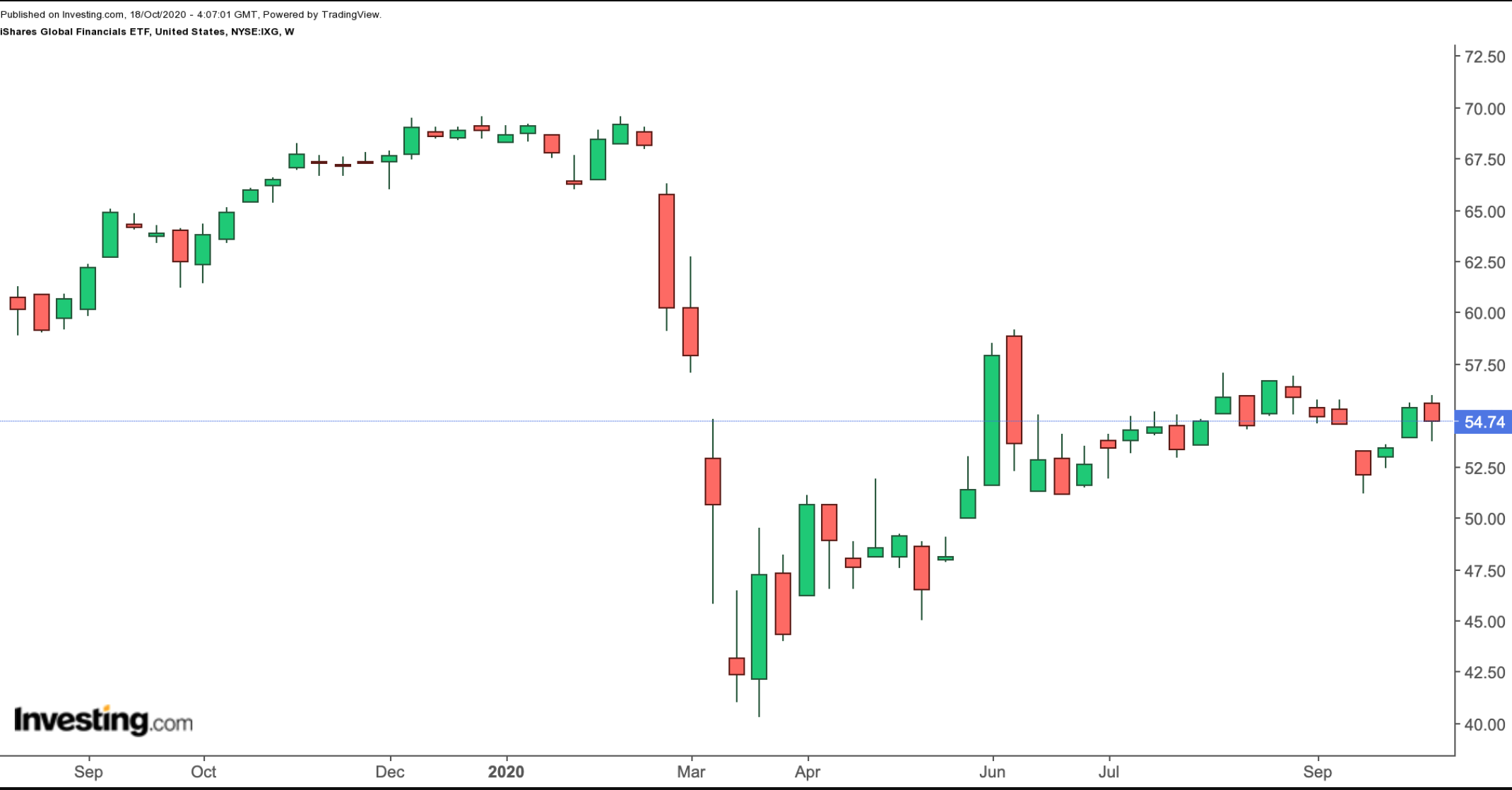The current US earnings season kicked off with results from several of the largest global banks.
Increased trading levels due to market volatility and a large number of IPOs contributed to healthy investment-banking revenues.
Today we'll take a deeper look at factors that influence bank earnings, the Q3 results and finally, we'll introduce a Financial Services ETF worth considering:
Influencing Factors
Financial institutions, such as banks, offer customers a range of products and services. For commercial banks, loans they give to customers make up most of their assets, while deposits, which are available to their depositors or creditors on demand, make up a large portion of their liabilities. Loans that banks provide typically have longer maturities than their liabilities. Therefore, bank earnings are greater when they lend money at a higher rate than the interest they pay out to depositors. As we evaluate a bank's earnings, we can arrive at net interest income by deducting interest paid from the total interest earned.
Yet, a large number of banks operate a hybrid model, meaning they generate some of their revenue from activities that do not bear interest. This revenue includes fees from capital markets operations, investment and brokerage services, trading profit and losses, banking service charges, credit card fees, mortgage-related activities and mobile banking operations fees.
As a result, a bank's income is divided into net interest income and non-interest income. Different banks have different exposures to these lines of business, which influences their revenues as highlighted in last week's reports from banks stateside.
Q3 Bank Earnings Results
Results from Citigroup (NYSE:C), Goldman Sachs (NYSE:GS), JPMorgan Chase (NYSE:JPM) and Morgan Stanley (NYSE:MS) showed robust operations in securities-trading and capital markets, particularly in fixed income and asset management.
On the other hand, numbers from Wells Fargo (NYSE:WFC) came short of expectations. The current low-interest rates have negatively affected the bank's interest income.
Wells Fargo CEO Charlie Scharf explained,
"Our third quarter results reflect the impact of aggressive monetary and fiscal stimulus on the US economy. Strong mortgage banking fees, higher equity markets, and declining sequential charge-offs positively impacted our results, while historically low interest rates reduced our net interest income and our expenses continued to remain elevated."
Finally, metrics from Bank of America (NYSE:BAC), which is big in both commercial and investment banking, were somewhere in between. CEO Brian Moynihan said:
"As the economy continued to recover, we generated nearly $5 billion in earnings this quarter, reflecting the diversity of our business model."
Today we'll take a deeper look at the different factors that impact the performance of banks and introduce a Financial Services ETF worth considering:
iShares Global Financials ETF
- Current price $54.74
- 52-week range $40.26 - 69.57
- Dividend yield: 3.03%
- Expense ratio: 0.46%
The iShares Global Financials ETF (NYSE:IXG) provides exposure to firms that provide financial services to commercial and retail customers, such as banks, investment funds and insurance companies. The fund has been trading since 2001.

IXG, which has 191 holdings, tracks the S&P Global 1200 Financials Sector Index. The top ten names of the ETF comprise around 28% of net assets, which stand at $245 million.
Berkshire Hathaway (NYSE:BRKa) (NYSE:BRKb), JPMorgan Chase and Bank of America head the list of holdings. Almost half of the businesses in the fund are US-based. Next in line are Canada (7.78%), the UK (5.41%), Australia (5.23%) and Japan (4.83%).
Since the start of the year, the fund is down about 20%. Those investors who are encouraged by the latest earnings results and believe the worst of the economic effects of the pandemic are possibly behind us could consider buying the dips.
Bottom Line
The state of the economy is the most important factor impacting a bank's earnings. The Q3 results from the top US banks do not raise many alarm bells and even with the uncertainties associated with the upcoming US election, financial stimulus package and the implications of the pandemic, the US consumer may end up doing better than initially feared earlier in the year.
Investors who are interested in banks with a regional flair stateside may also want to research another ETF, namely the SPDR® S&P Regional Banking ETF (NYSE:KRE). The fund, which has first listed in 2006, has 126 holdings. Year-to-date, the KRE is down about 32%, flirting with $40. Its dividend yield stands at 4.42%. Many of the banks in the fund are trading below their book values. Contrarian investors may begin to find value in the ETF.
In future months, we will continue our discussion on this important sector of the economy and discuss various metrics investors could consider when analyzing bank shares.
